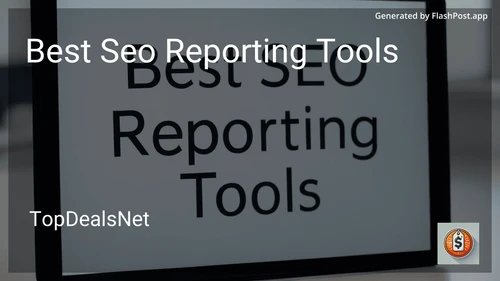Best SEO Reporting Tools in February 2026

Ahrefs
- Comprehensive backlink analysis
- Keyword research tools
- Rank tracking
- Site audit functionality
- Content exploration and analysis

SEMrush
- Keyword research and analysis
- Competitor analysis
- Site audit and technical SEO
- On-page SEO checker
- PPC analysis

Google Analytics
- Traffic analysis
- User behavior tracking
- Conversion tracking
- Audience insights
- Integration with Google Ads

Moz Pro
- Keyword research tools
- Site audits
- Rank tracking
- On-page optimization suggestions
- Link explorer
In the ever-evolving landscape of digital marketing, search engine optimization (SEO) remains a cornerstone for driving traffic to websites. To measure and optimize the success of your SEO strategy, having the right reporting tools is crucial. This article explores the essentials of SEO reporting tools and offers guidance on choosing the best one for your needs.
Understanding the Importance of SEO Reporting Tools
SEO reporting tools are invaluable assets for marketers, SEO professionals, and business owners aiming to improve their online presence. These tools provide insights into numerous aspects of SEO performance, such as keyword rankings, backlinks, traffic sources, and more. By using an SEO reporting tool, you can identify opportunities for improvement, track progress over time, and demonstrate the value of your SEO efforts to stakeholders.
Key Features of Effective SEO Reporting Tools
When choosing an SEO reporting tool, it's essential to look for features that align with your goals and needs. Here are some key features to consider:
1. Comprehensive Data Collection
Effective SEO reporting tools should collect data from various sources to provide a complete picture of your SEO performance. This includes data on organic traffic, keyword rankings, backlinks, and site audits.
2. Customizable Reports
Customizable reports are crucial for tailoring the information according to your stakeholders’ preferences. Look for tools that allow you to customize metrics, time frames, and formats to create reports that best meet your requirements.
3. User-Friendly Interface
A user-friendly interface ensures that you and your team can easily navigate the tool and generate reports without extensive training or technical expertise. Tools with intuitive dashboards can enhance productivity and efficiency.
4. Integration Capabilities
SEO reporting tools that integrate with other marketing platforms and analytics tools, such as Google Analytics, can provide a more comprehensive view of your marketing efforts. Integration capabilities are vital for streamlining data collection and analysis.
5. Real-Time Data Access
Access to real-time data allows you to monitor your SEO performance as it happens. This feature is essential for making timely decisions and adjustments to your strategy.
6. Scalability
Consider whether the tool can scale with your business as it grows. A scalable SEO reporting tool will accommodate more data and expanded functionalities as your needs evolve.
Factors to Consider When Choosing an SEO Reporting Tool
Selecting the right SEO reporting tool can be challenging with the wide variety of options available. Here are some factors to consider to ensure you make the best choice:
1. Identify Your Goals
Before choosing a tool, clearly define your SEO goals. Consider whether you're focused on improving keyword rankings, increasing organic traffic, boosting conversion rates, or enhancing backlink profiles.
2. Assess Your Budget
SEO reporting tools vary significantly in price. Establish a budget that aligns with your needs and explore options within that range, keeping in mind that a higher price doesn't always equate to a better tool.
3. Evaluate Ease of Use
Consider the learning curve associated with a new tool. Evaluate whether you and your team have the time and resources to invest in learning a complex system or if a simpler, more intuitive tool would be more suitable.
4. Seek Reviews and Feedback
User reviews and testimonials can provide valuable insights into the strengths and weaknesses of a particular tool. Look for feedback from users in your industry to gauge how well a tool meets your specific requirements.
5. Test with Free Trials
Utilize free trials or demos to test the functionality and compatibility of the tool with your current systems. This can help you make an informed decision based on firsthand experience.
Conclusion
SEO reporting tools are indispensable for effectively monitoring and optimizing your SEO efforts. By understanding key features and evaluating relevant factors, you can choose the best tool to meet your specific needs and drive success in your SEO strategy. Taking the time to select the right tool will pay off with enhanced insights and improved decision-making capabilities.
